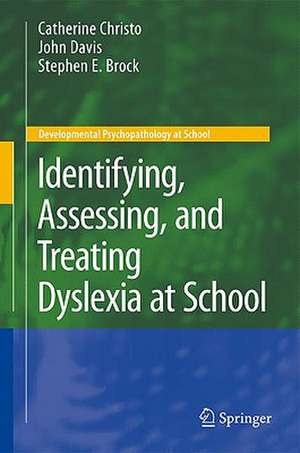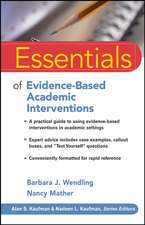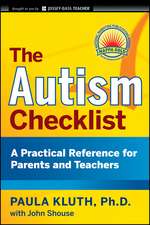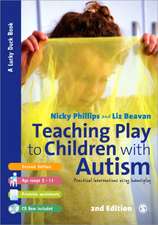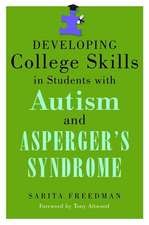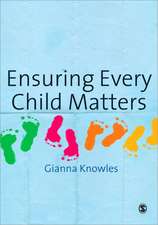Identifying, Assessing, and Treating Dyslexia at School: Developmental Psychopathology at School
Autor Catherine Christo, John M. Davis, Stephen E. Brocken Limba Engleză Hardback – 20 feb 2009
Identifying, Assessing, and Treating Dyslexia at School equips practitioners with in-depth understanding of the disorder and a wealth of practical information for meeting student needs. This volume:
- Reviews up-to-date findings on dyslexia – causes, prevalence, and related conditions.
- Provides research-based tools for identifying and addressing dyslexia.
- Offers a detailed framework for case finding and screening, diagnostic and psychoeducational assessment as well as age- and grade-appropriate intervention.
- Explains the roles and responsibilities of school psychologists when it comes to identifying students with dyslexia.
- Focuses solely on dyslexia, unlike most other books on learning disabilities.
| Toate formatele și edițiile | Preț | Express |
|---|---|---|
| Paperback (1) | 645.49 lei 6-8 săpt. | |
| Springer Us – noi 2010 | 645.49 lei 6-8 săpt. | |
| Hardback (1) | 715.55 lei 6-8 săpt. | |
| Springer Us – 20 feb 2009 | 715.55 lei 6-8 săpt. |
Preț: 715.55 lei
Preț vechi: 753.22 lei
-5% Nou
Puncte Express: 1073
Preț estimativ în valută:
136.92€ • 142.95$ • 113.32£
136.92€ • 142.95$ • 113.32£
Carte tipărită la comandă
Livrare economică 04-18 aprilie
Preluare comenzi: 021 569.72.76
Specificații
ISBN-13: 9780387885995
ISBN-10: 0387885994
Pagini: 152
Ilustrații: XII, 152 p. 9 illus.
Dimensiuni: 155 x 235 x 11 mm
Greutate: 0.41 kg
Ediția:2009
Editura: Springer Us
Colecția Springer
Seria Developmental Psychopathology at School
Locul publicării:New York, NY, United States
ISBN-10: 0387885994
Pagini: 152
Ilustrații: XII, 152 p. 9 illus.
Dimensiuni: 155 x 235 x 11 mm
Greutate: 0.41 kg
Ediția:2009
Editura: Springer Us
Colecția Springer
Seria Developmental Psychopathology at School
Locul publicării:New York, NY, United States
Public țintă
Professional/practitionerCuprins
Causes.- Prevalence and Associated Conditions.- Case Finding and Screening.- Diagnostic Assessment.- Diagnostic Assessment.- Treatment.
Notă biografică
Catherine Christo, Ph.D., NCSP, is professor of school psychology at California State University Sacramento and coordinator of the School Psychology Graduate Program. She previously worked as a school psychologist in Davis Joint Unified School District and Yolo County Office of Education. Dr. Christo teaches courses in cognitive assessment, preventive academic interventions, and assessment of learning disorders. She is a past board member of the California Association of School Psychologists, and maintains a private practice as a Licensed Educational Psychologist. Dr. Christo is a frequent presenter at professional meetings primarily on topics related to reading disability, assessment, curriculum based measurement and response to intervention models.
John M. Davis, Ph.D., is currently a professor at California State University East Bay where he teaches and supervises in the Clinical Child and School Psychology Program. He received his Ph.D. from the U.C. Berkeley School Psychology program and did clinical postdoctoral studies to become a licensed psychologist. He has a special interest in learning and developmental disorders and has been the director of a school and clinic for students with learning disabilities for 13 years that provided diagnostic and intervention services. His current clinical work is primarily with children and adults with learning disorders. His writing and research interests include articles and book chapters in the areas of mental health consultation, suicide/crisis intervention, and learning disorders.
Stephen E. Brock, Ph.D., NCSP, is an associate professor at California State University Sacramento. Previously, he worked for 18 years as a school psychologist with the Lodi Unified School District (the last six of which included assignments as Lead Psychologist). His professional preparation includes a Ph.D. at the University of California, Davis, where he researched AD/HD, and was one of the first researchers to identify the reading comprehension deficits often found among students with AD/HD. Dr. Brock currently serves on the editorial boards of both state and national school psychology association newsletters and is an Associate Editor of The California School Psychologist (a peer peer-reviewed journal with the second largest distribution of school psychology journals in the United States). He is Past-President of the California Association of School Psychologists and a member of the National Association of School Psychologists Delegate Assembly and its Executive Counsel. Dr. Brock has authored more than 140 publications (including four books) and has made more than 65 referred or invited state/national conference presentations. In addition to AD/HD, his academic work has included study of school crisis response, suicide prevention, autism, behavioral interventions, violence prevention, threat assessment, child development, and reading comprehension.
John M. Davis, Ph.D., is currently a professor at California State University East Bay where he teaches and supervises in the Clinical Child and School Psychology Program. He received his Ph.D. from the U.C. Berkeley School Psychology program and did clinical postdoctoral studies to become a licensed psychologist. He has a special interest in learning and developmental disorders and has been the director of a school and clinic for students with learning disabilities for 13 years that provided diagnostic and intervention services. His current clinical work is primarily with children and adults with learning disorders. His writing and research interests include articles and book chapters in the areas of mental health consultation, suicide/crisis intervention, and learning disorders.
Stephen E. Brock, Ph.D., NCSP, is an associate professor at California State University Sacramento. Previously, he worked for 18 years as a school psychologist with the Lodi Unified School District (the last six of which included assignments as Lead Psychologist). His professional preparation includes a Ph.D. at the University of California, Davis, where he researched AD/HD, and was one of the first researchers to identify the reading comprehension deficits often found among students with AD/HD. Dr. Brock currently serves on the editorial boards of both state and national school psychology association newsletters and is an Associate Editor of The California School Psychologist (a peer peer-reviewed journal with the second largest distribution of school psychology journals in the United States). He is Past-President of the California Association of School Psychologists and a member of the National Association of School Psychologists Delegate Assembly and its Executive Counsel. Dr. Brock has authored more than 140 publications (including four books) and has made more than 65 referred or invited state/national conference presentations. In addition to AD/HD, his academic work has included study of school crisis response, suicide prevention, autism, behavioral interventions, violence prevention, threat assessment, child development, and reading comprehension.
Textul de pe ultima copertă
As many as one in four children experiences problems with reading. Dyslexia, the most common learning disability leads to well-documented negative effects on school and, ultimately, adult success. Therefore, it is critical that school professionals provide early and effective assessment and intervention.
Identifying, Assessing, and Treating Dyslexia at School equips practitioners with in-depth understanding of the disorder and a wealth of practical information for meeting student needs. This volume:
Identifying, Assessing, and Treating Dyslexia at School equips practitioners with in-depth understanding of the disorder and a wealth of practical information for meeting student needs. This volume:
- Reviews up-to-date findings on dyslexia – causes, prevalence, and related conditions.
- Provides research-based tools for identifying and addressing dyslexia.
- Offers a detailed framework for case finding and screening, diagnostic and psychoeducational assessment as well as age- and grade-appropriate intervention.
- Explains the roles and responsibilities of school psychologists when it comes to identifying students with dyslexia.
- Focuses solely on dyslexia, unlike most other books on learning disabilities.
Caracteristici
Provides practitioners with an understanding of dyslexia and, more important, with research-based tools for diagnosing dyslexia from other reading disabilities and with guidelines for intervention Clearly identifies the roles and responsibilities of school psychologists when it comes to the identification of students with dyslexia
